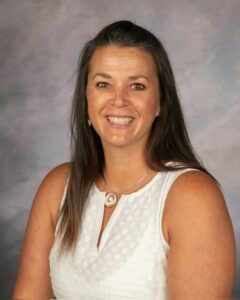 Tiffany DeGraffenreid joined the CCAP Board of Directors in February of 2024, bringing with her two decades of charter school experience, including first-hand knowledge of the discrete needs and operations of independent study and nonclassroom-based charter schools that can make them a challenge for authorizer oversight.
Tiffany DeGraffenreid joined the CCAP Board of Directors in February of 2024, bringing with her two decades of charter school experience, including first-hand knowledge of the discrete needs and operations of independent study and nonclassroom-based charter schools that can make them a challenge for authorizer oversight.
“I feel as close to an expert as you can self-pronounce about independent study. I’ve lived it for 20-plus years now,” said DeGraffenreid, who founded an independent study charter school in San Diego and believes these schools need more visibility because they meet a need that some students cannot get in more traditional schools. “I felt like my background could be helpful in rounding out the Board,” she added.
Four years ago, DeGraffenreid made the move from charter school leader to charter authorizer in San Diego Unified School District’s Charter School Office. In 2023, she became manager of the Charter School Office, which oversees 41 charter schools that enroll about 19,000 students.
Being in both worlds has given DeGraffenreid a perspective that allows her to balance the intrinsic autonomy of charter schools with the requirements of meeting state standards.
“I do support my charters, but I support them in the way that I’m pointing them in the right direction,” she explained while on her way to visit a school whose charter is coming up for renewal. “I don’t want to tell them what to do.” She describes each annual site visit as a progress report that lets school officials know about areas of concern. “The oversight that I’m providing is ensuring that they are compliant with their charter, that they’re compliant with the Ed Code, and that they have all their policies intact. We don’t want any ‘aha, gotcha’ moments.”
But DeGraffenreid acknowledges that overall oversight is not where it should be, especially regarding nonclassroom-based charters, and that has to start with better definitions. The school that she founded, Ingenuity Charter School, is an independent study charter school for grades 6-12 that is designed to serve vulnerable student populations in San Diego.
Ingenuity is a hybrid school. Students do some work at home and take in-person classes several days a week at one of the four learning centers for science labs, direct instruction in math and other subjects, and one-on-one tutoring. Hybrid-structured schools have been gaining momentum ever since COVID and are one of several independent study charter school models that are all lumped—mistakenly, DeGraffenreid believes—into the single category of nonclassroom-based charters, which may be entirely virtual.
She was glad to see the California Legislative Analyst’s Office (LAO) and the Fiscal Crisis & Management Assistance Team (FCMAT) concur on this point in their February 2024 report, “Review of the Funding Determination Process for Nonclassroom-Based Charter Schools.” The state legislature commissioned the study to identify weaknesses in the finance system that over the years have allowed some corrupt officials, disproportionately those running nonclassroom-based charters, to defraud public schools.
The most ignoble example is the A3 charter school network, whose operators falsified enrollment data and stole at least $400 million in state school funds. Both the LAO/FCMAT report and CCAP’s Anti-Fraud Task Force report, “Protecting California Public Schools Against Fraud,” released in April 2024, found that A3 was able to do that by getting small school districts to authorize charters with more than ten times the districts’ enrollment in exchange for oversight funds, even though the districts did not have enough staff to provide adequate oversight.
These situations upended the authorizer-charter school relationship by making the districts dependent on the charter schools for their operating budget. Authorizing “is oversight, not a partnership,” said DeGraffenreid.
As a CCAP board member, DeGraffenreid wants to expand efforts already underway to support small authorizers with “a hands-on push to reach out to them, sit with them, and help them set up a program” to strengthen oversight. “I believe it would provide reassurance to both the authorizers and charter schools about their actions.”
